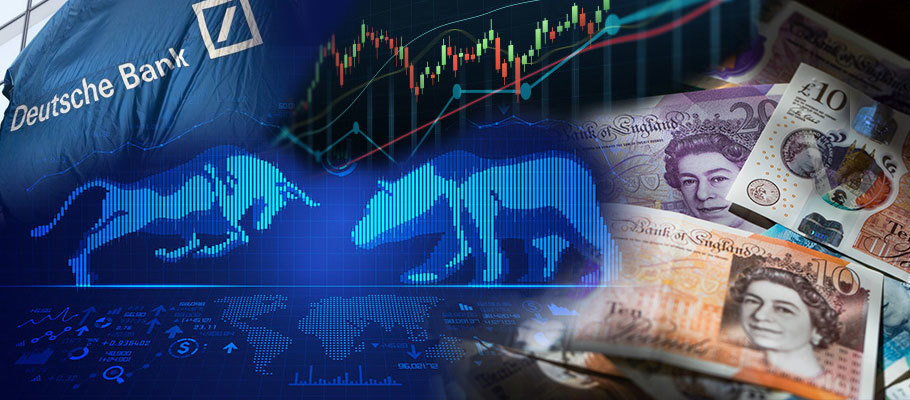
Published: May 28th, 2021
Deutsche Bank, one of the planet’s biggest foreign exchange players, has issued new guidance on the British pound. In a strategy brief published earlier this week, the banks said that … ‘while the stars have aligned for sterling to date this year, a lot of the upward momentum has been speculative’.
A second look at the fundamentals has convinced Frankfurt-based Deutsche that it needs to ‘shift from bull to bear’ on GBP. If the call is correct, it could serve as a warning to market participants currently sat on the sidelines and planning for continued pound advances.
However, there's more to the change of position than simply saying sterling's 2021 run is losing steam. Deutsche analysts also think the Bank of England is getting set to disappoint markets with the timing of its first interest rate rise in ages.
The expected economic rebound forecast for 2021 might also underwhelm, thanks to new COVID-19 variants and the possibility that a consumer-led rebound might not materialise.
Shoppers may not flock back to the shops as quickly as presumed, given the number of false dawns the Johnston government has declared in its on and off again battle with the pandemic. As such, Deutsche Bank is telling traders to sell the pound and look instead to the euro and Swedish krona.
‘A strong vaccination rollout and positive economic data mean the stars have aligned for sterling so far this year,’ said an investor note from Deutsche’s forex strategy unit. ‘Stock market rallies and strong inflows have all pushed the pound to its best start to a year since 2015. We think a lot of the positive news, however, is in the price. For longer-term gains, there are better European currencies to buy.’
Sterling has been one of the happier currency stories of Q1 2021, but in April, it began to struggle and sent back a sizeable proportion of its earlier gains.
May has seen a partial recovery, and that’s been enough to prompt some analysts back to confidence that the trends established from January to March are reasserting.
Currency strategists at Dankse Bank said in a note to investors this week that they remain bullish on GBP. ‘We are still more positive on UK economic prospects than we are for the Eurozone’.
One element driving the May recovery in some Pound exchange rates has been the early-May Bank of England announcement that the scale of monthly quantitative easing will be scaled back.
Before that news, the pound-to-euro exchange rate had sunk back to lows of around 1.1459 in April before bouncing back to 1.1679 in May after the BoE decision.
The pound-to-dollar rate recovered from April lows of 1.35 and rose to highs above 1.42 this week.
Markets interpret the central bank move as an early signal that it is stepping back from the generous economic stimulus it offered during the pandemic, a vital first step in the direction of interest rate normalisation.
Sterling has tended in the past to find support when BoE policy shifts towards higher interest rates. The nearer the launch date for a rate rise, the more support it gets.
But Deutsche says the market is likely being too optimistic on the interest rate front. The bank’s flip to a bearish stance on the pound is partly predicated on the concern that a new coronavirus variant could emerge that knocks the country's reopening process off the rails.
Perceptions that the UK has led the developed world in the success of its vaccination rollout has prompted economists to raise economic growth forecasts and bet that Threadneedle Street will find itself in a position to raise interest rates sooner than later.
Deutsche Bank currency strategists cite the arrival of the ‘Indian’ variant of COVIDI-19 in some parts of the UK as reason for caution, noting that Britain’s path out of lockdown is still strewn with obstacles.
Westminster has planned a full reopening of the economy, dubbed ‘The Big Unlock,’ for late June, but with current pricing, Deutsche says ‘the risks are asymmetrically on the downside.’
However, that's out of step with the opinion of many other economists who believe that the impact of the new variant won’t be sufficient to knock the final moves out of lockdown off course. Against an accelerating rate of immunisation, only a total return to lockdowns would achieve that.
Economist at Pantheon Macroeconomics told Reuters this week that ‘with the current growth rate, it would take at least 30 weeks for new cases to hit the red zone seen in early November when the Johnston government decided to impose a second lockdown.’
Another cornerstone of this year’s pound rebound story is the assumption made by many economists that consumers are chomping at the bit to start spending again, driving a hockey stick spike in economic output.
But Deutsche Bank points to the case of Israel, which counters the consumption that the economy will rise rapidly above its current steady-state. Sterling might suffer if the same shoppers show the same restraint in the UK once they're fully 'released' from lockdown.
‘The post-Brexit upswing in M&A flows has also supported sterling in 2021, alongside moves by asset managers to reallocate funds into GBP. Both these flows, however, look to have reached their peak.’
Deutsche says ‘it’s been a good run for the pound this year so far, but the euro is likely to be the focus this summer for investors who want to invest in Europe. The bank is currently buying EUR/GBP in anticipation that its ‘bearish house view’ on the pound is realised.